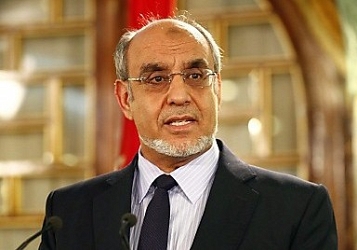Erstellt am: 20. 2. 2013 - 15:19 Uhr
Another first for Tunisia
Subscribe to the Reality Check podcast and get the whole programme after the show.
When the first leader fell in the Arab Spring, and it looked as though a wave of relatively peaceful revolutions would follow across North Africa and the Middle East - Tunisia was at the forefront. The first country to kick out its dictatorial president, the first country to form it's own democratically elected government, and the first country to get back to some sense of normality.

EPA
Now, Tunisia is first again. Prime Minister Hamadi Jebali has become the first post Arab Spring leader to resign, after losing the support of his own party.
It must be said, that Mohammed Morsi in Egypt is also coming under pressure, with opposition parties calling for him to stand down. But so far, he has hung on.
Libya is still trying to establish some sort of government, and so it not yet in a position to get rid of it again.
So why has the enthusiasm and fervour of the Arab Spring turned so sour? Cengis Gunay says the reason is simple. People expected far too much, far too soon.
Dieses Element ist nicht mehr verfügbar
Bulgaria's governement resigns

APA
Bulgaria's government says it is resigning amid violent protests against austerity measures and electricity prices. Prime Minister, Boiko Borisov, countered the scenes of riots in the capital, Sophia with populist a populist statement that may help ensure he is not out of office for long. In fact, it is still unclear whether even the parliament will accept his resignation.
Nick Thorpe reports on the latest developments and their implications.
Dieses Element ist nicht mehr verfügbar
China denies hacking accusations
China says reports linking it to the hacking of targets in the US is flawed. Internet security expert, Graham Cluley gives his reaction to the claims and counter claims.
Dieses Element ist nicht mehr verfügbar
Saudi Arabia's first women on the Shura Council
The King of Saudi Arabia has sworn in the first women ever to sit on the advisory Shura Council. Riem Higazi looks at the slow progress towards women's rights in one of the world's most conservative Islamic states.
Dieses Element ist nicht mehr verfügbar
Ireland apologieses to laundry women
The Irish government officially apologies to the women who suffered abuses in the so called Magdalene Laundries. Fran McNaulty explains the social background to the laundries and reports on how the victims are reacting to the apology,
Dieses Element ist nicht mehr verfügbar
FM4 Reality Check
Monday to Friday from 12.00 to 14.00, and after the show via Podcast or fm4.orf.at/realitycheck.


